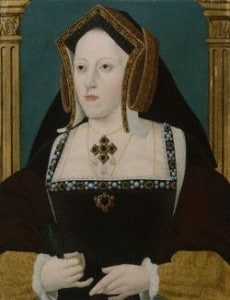 On 9th April 1533, Catherine of Aragon, first wife of King Henry VIII, received a visit from members of the King’s Council, headed by Thomas Howard, 3rd Duke of Norfolk. The purpose of their visit was to inform Catherine that Henry VIII was now married to Anne Boleyn and that Catherine was no longer queen. The delegation gave her the news about Henry’s second marriage, but left it to Catherine’s chamberlain, Sir William Blount, 4th Baron Mountjoy, to break the news that she had been demoted from Queen to Dowager Princess of Wales.
On 9th April 1533, Catherine of Aragon, first wife of King Henry VIII, received a visit from members of the King’s Council, headed by Thomas Howard, 3rd Duke of Norfolk. The purpose of their visit was to inform Catherine that Henry VIII was now married to Anne Boleyn and that Catherine was no longer queen. The delegation gave her the news about Henry’s second marriage, but left it to Catherine’s chamberlain, Sir William Blount, 4th Baron Mountjoy, to break the news that she had been demoted from Queen to Dowager Princess of Wales.
Eustace Chapuys, the Imperial ambassador and a friend of Catherine’s, reported news of the visit to his master, Emperor Charles V, on the 10th April:
“…he is fully resolved, as he has told many, and those of his Council publish, that immediately after Easter he will solemnize his marriage and the coronation of the Lady. The better to prepare the way, he sent yesterday the dukes of Norfolk and Suffolk, the marquis and the earl of Ausburg (?) to the Queen, to tell her that she must not trouble herself any more, nor attempt to return to him, seeing that he is married, and that henceforth she abstain from the title of Queen, and assume the title of duchess (princess), leaving her the entire enjoyment of the goods she formerly had, and offering her more, if she needed more. The Queen would not fail to advertise me of the interview. I know not whether they are in any doubt as to the Queen’s willingness to dislodge or not; but about eight days ago, the King’s council commanded my lord Mountjoy to rejoin her with all diligence, and keep watch upon her, and not leave her.”1
Catherine had been married to Henry VIII for nearly 24 years and saw herself as his rightful queen; she therefore refused to acknowledge her new title and carried on referring to herself as Queen. On 3rd July 1533, Lord Mountjoy was instructed to inform Catherine that she was to stop referring to herself as ‘Queen’ and to recognise her title of Princess Dowager. The instructions came in the form of a letter from Thomas Cromwell delivered by members of the King’s Council:
“As the King cannot have two wives he cannot permit the Dowager to persist in calling herself by the name of Queen, especially considering how benignantly and honorably she has been treated in the realm. She is to satisfy herself with the name of Dowager, as prescribed by the Act of Parliament, and must beware of the danger if she attempt to contravene it, which will only irritate the feelings of the people against her. If she be not persuaded by these arguments to avoid the King’s indignation, and relent from her vehement arrogancy, the King will be compelled to punish her servants, and withdraw her affection from his daughter. Finally, that as the marriage is irrevocable, and has passed the consent of Parliament, nothing that she can do will annul it, and she will only incur the displeasure of Almighty God and of the King.”2
The Council members reported back to the King that Catherine “took exception to the name, persisting that she was the King’s true wife, and her children were legitimate, which she would claim to be true during her life”. Regarding the King’s marriage to Anne Boleyn, which the Council told her “had been adjudged lawful by the universities, the Lords and Commons”, Catherine replied that “the cause was not theirs but the Pope’s to judge”. She went on to say that “She did not defend her cause upon obstinacy, nor to create any dissension in the realm, but to save her own rights” and that she prayed daily for the King. She also requested a copy of the Council’s instructions to her so that she could send it to Rome.3 So incensed was Catherine with being demoted from Queen to Princess Dowager that she obliterated those words in the report. She would not submit and accept the annulment however much the King bullied her.
Notes and Sources
- LP vi. 324
- Ibid., 759
- Ibid., 760